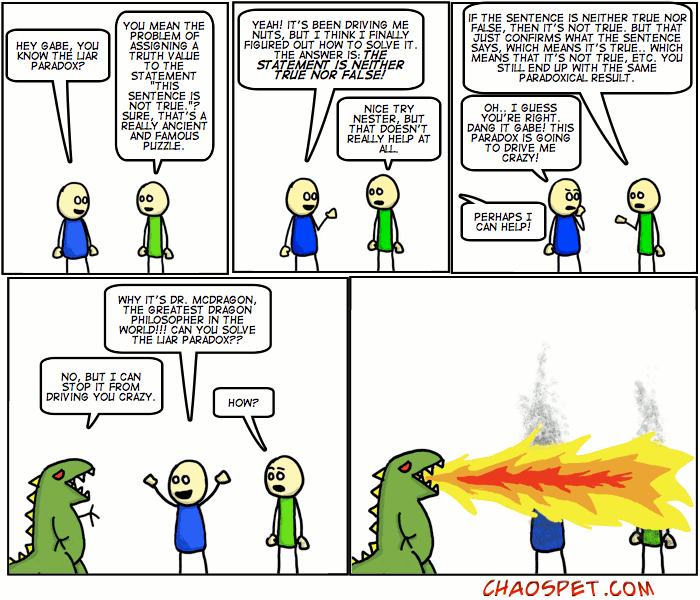Mmm, Liar Paradox, one of my favorite philosophical puzzles. I was in a rather silly mood when I drew this comic. Hope you enjoy.
chaospet
Now updated every day that it is updated


Mmm, Liar Paradox, one of my favorite philosophical puzzles. I was in a rather silly mood when I drew this comic. Hope you enjoy.
One would indeed expect an ancient being such as a dragon to offer such provocative and effective solutions to seemingly insoluble problems. An ancient vampire, for all its experience, could at most have quelled the questions of one philosopher-stick figure at a time.
With all due respect, chaospet (tips tinfoil hat).
P.S. Love the silly humor AND the bringing-philosophy-into-it.
My response to the liar paradox is that a statement can be True, False, or Meaningless. As well as “This sentence is a lie.”, Meaningless also includes statements such as “Banana.”, “The table is a.” and “Bla bla bla BLA”.
I get the sense that Dr. Mcdragon is a Buddhist.
It’s not sentences themselves that are true or false. It is the propositions expressed by them if any. One could claim that liar paradox sentences are cognitively meaningness, i.e. do not express propositions. That works but it is ad hoc. One would have to explain why they don’t express propositions. Because they are self-referring seems like an obvious answer, and it was tried, however, there are non-self-referring versions of the liar paradox.
http://www.rpi.edu/~brings/LOGARG/yablo.paradox/yablo.paradox.html
What, no dialetheism joke? I’m disappointed. =P
So… for once dialetheism is not the answer… (YAY!)
True and false are labels we give to (in this case) abstract ideas (should it really be plural?), as is often done in language. And our language allows for grammatical placement of this in a paradoxical way. What if we don’t use the English language?
Now I know that logical validity can have nothing to do with truth, but it is worth looking at I think.
Assigning a truth value to “This sentence is not true” is basically like putting a sentence before it saying “The next sentence is true.”
a is b and a is not b therefore: a is, what? WHAT IS IT! As a statement is this valid? I don’t know. Maybe I should look up my TOK logic notes again.
Personally though I think the binary idea of true and false, 1 and 0, or however that works is probably flawed. I never liked black and white, I prefer gray, that doesn’t mean gray is the actual answer, but it looks like there is something else going on here (other than dialetheism). But if we have gray were logic is concerned the world would implode, after all aren’t logic and math supposed to be as black and white as we can get?
Sorry if I make no sense, it’s been awhile.
@Dylan @Canuovea: I was tempted to go with dialetheism, but then Dr. McDragon’s approach to the problem seemed like a better idea.
@John: You may be on to something.
@Emil: Thanks for that link, very interesting!
@Zig: I’m pretty sure that “Banana.” is false
@Wm: Thanks! Glad you enjoy
But isn’t the liar paradox self-contradictory? Like saying “This is everything that it isn’t”. About the propositions expressed by the ideas, I am not sure what you are saying. If you are talking about what the speaker means by saying them, wouldn’t the meaning of “this is a lie” boil down to “Look! A paradox!”?
a is b and a is not b:
This reminds me of my 3 years old cousin. He asked his moms if cars are noisy (in dutch). She said:
“some cars are noisy”
he asked if they have a “some car”
I wanted to “help” so I said:
also “some cars aren’t noisy”
now he was really confused and after thinking a little he said:
“but also non some cars are noisy”
of course this is not the same problem if you understand what “some” means:)
But: Zig was onto something with true, false and meaningless. Only in a sense the sentence contains meaning so I’d just call it silly.
I’m instantly amused by trying to apply that to the war on terrorism in Iraq and Afghanistan.
Found the link at the xkcd fora. To be honest, I don’t really like most of the user-submited comics (links) over there, with a few exceptions. Yours is one of those. Awesome, man, this goes straight into my Bookmarks!
Keep up the good humor! Cheers 🙂
@bittyx: Thanks for the kind words, I’m glad you enjoy the comics!
@EveryZig
Yes it is. As it is with contradictions the negation of them is a necessary truth. But that’s not the case with the liar paradox since the negation is also a contradiction. That’s why it’s a paradox.
“About the propositions expressed by the ideas”
Read more careful. Propositions are what is expressed by cognitively meaningful sentences or statements. Here’s a link to back that up.
http://philosophypages.com/dy/p9.htm#prop
It’s an appeal to authority but there are also proper arguments for the position, of course. I’ve written a bit about it. Here for instance:
http://philosophypages.com/dy/p9.htm#prop
Ugh. Apparently I didn’t copy that properly. Here it is:
http://deleet.dk/2009/06/14/meaning-propositions-category-errors/
About Yablo’s paradox. This version is better:
http://www.mit.edu/~yablo/pwsr.pdf
It took me a while to understand the inferences.
I don’t recall implying that referring to itself made it invalid… My argument for it’s being meaningless is that it does not convey any information that it does not contradict.
[…] channeling the later Wittgenstein, Ryan Lake of chaospet has a humorous solution to dealing with the Liar […]